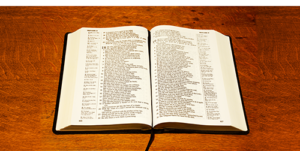Dr. McKellar’s Lesson for March 28, 2021
Hanging on His Words
Luke 19:28-48
1. Introduction
• preceding our text: Zacchaeus (19:1-10) and Ten Minas (19:11-27)
• moving toward Jerusalem and the cross: three symbolic acts that highlight the identity of Jesus
2. Jesus Enters Jerusalem (28-40)
• two disciples dispatched
• prophetic fulfillment (Zech. 9:9-10)
• disciples rejoice and praise (Psa. 118:26)
• objection from some Pharisees
• stones that cry out: inevitable praise
3. Jesus Weeps over Jerusalem (41-44)
• compassion/emotion of Jesus
• a peace hidden from their eyes (John 1:11)
• prediction of demise due to visitation insensitivity
• stones that fall down: inevitable destruction (Hab. 2:11)
4. Jesus Cleanses the Temple (45-48)
• denunciation of Temple practices (Mal. 3:1-4, Isa. 56:7, Jer. 7:11)
• daily routine in the Temple
• objective of the religious establishment
• people “hanging on His words”
5. So What?
• Because Jesus Christ has authority over all creation and alone can rescue it, hang on His words and join the chorus of His praise.
• “I hang upon the Savior, as actually perishing without His unbounded mercy and unintermitted care.” (Simeon)
Dr. McKellar’s Lesson for March 21, 2021
Beyond Religious Performance
Luke 18:9-14
Introduction
-What’s the real problem?
-Are we self-centered or God-centered?
-Recognition of contextual connections
1. Jesus targets the self-sufficient (9)
• misplaced trust
• mistreatment of others
2. Jesus teaches through vivid contrast (10-13)
• a religious performer: his attitude, actions and articulation
• a spiritual pauper: his attitude, actions and articulation
3. Jesus transmits a timeless truth (14)
• Only those who acknowledge the extremity of their need may enjoy the exaltation of intimacy with Jesus.
• A repeated NT theme: 1 Peter 5:5-7
• Recognize that self-justifiers remain unjustified.
• Understand the peril of religious performance.
• “Rock of Ages, Cleft for Me…” (Toplady)
• Serve Jesus with broken-hearted joy.
Dr. McKellar’s Lesson for March 14, 2021
The Son Who Stayed Home
Luke 15:11-32
1. Contextual Considerations
• identification of target audience in 15:1
• intensification in the three parables of Luke 15
• inclusion of 15:25-32
2. An Unusual Request 11-13
• man with two sons
• younger son requests inheritance
• division of property
3. A Journey into a Far Country 14-16
• squandered his property in reckless living
• severe famine and need
• feeding pigs
4. A Return Journey 17-20a
• when he came to himself
• contrasting his status with hired servants
• rehearsal of speech
5. A Compassionate Reception 20b-24
• the father’s actions: saw, felt, ran, embraced, kissed…
• the younger son’s confession
• robe, ring, shoes and festive celebration
6. An Angry Older Brother 25-32
• informed of his brother’s return
• an angry protest and an embellishment
• the father’s response
7. So What?
• Because of God’s heart for the lost, extend His compassion and join His celebration!
• “And so through all the length of days Thy goodness faileth never; Good Shepherd, may I sing Thy praise within Thy house forever.” (Baker)
Dr. McKellar’s Lesson for March 7, 2021
Two Insensitive Jews and a Surprising Hero
Luke 10:25-37
1. A Neglected Setting (25-29)
• transparent motivation
• crucial question
• correct response
• diversionary tactic
2. A Familiar Story (30-35)
• avoidance: fear of contamination and complication
• engagement: distinguished by compassion
• expression: through care, courage and commitment
3. A Timeless Challenge (36-37)
• identifying a neighbor
• modeling of mercy
• called not to calculate but to care
• called not to sentimental feeling but to sacrificial action
• called not to achieve but to receive
• from the Good Samaritan to the Great Shepherd
4. So What?
• In light of the matchless mercy of Jesus, remember that loving your neighbor begins with the dimensions of your heart rather than the dimensions of your neighborhood.
• “If the truth were known…” (Miracle of Mercy by Stephen Curtis Chapman)
• “Why should I gain from His reward? I cannot give an answer; But this I know with all my heart-His wounds have paid my ransom.” (How Deep the Father’s Love for Us by Stuart Townend)
Dr. McKellar’s Lesson for February 28, 2021
Providence, Pandemic and Perspective
Job 38-42
1. Introduction
• defining providence
• distinguishing providence from fate
2. Observations from Job 38-42
• Job suffers and his “friends” respond
• Job wants a meeting to present his “case” (31:35)
• Job is given a series of “knowledge” tests (38:3)
• Job gets a guided tour of the created order (38:4-39:30)
• Job is left speechless (40:1-5)
• The “lesson” continues (40:6-41:34)
• The reminder from 41:11
• repentance, rebuke and restoration (42)
• connection to Christ (Phil. 2:5-11)
3. What the LORD is saying through this pandemic
• Remember that you are not in control (Deut. 32:39)
• Worship only Me (Isa. 45:22-23)
• View your circumstances from My perspective (Psa. 34:18-22 and Isa. 40:8)
• Think bigger thoughts of Me (Isa. 55:8-9)
• Maximize the “mist” that is your life (James 4:13-17)
4. So What?
• The pervasive providence of God points us to the necessity of Christ being our pervasive reality.
• “The same sovereignty that could stop Covid yet doesn’t is the very sovereignty that sustains our souls in it.”
• “When your by-and-by is beautiful and sure, your here-and-now will be sweet and fruitful.”
• “This is not a season for sentimental views of God.” (Piper in Coronavirus and Christ)
• “He’s got the whole world in His hands…” (Warner)
Dr. McKellar’s Lesson for February 14, 2021
Extravagant Love
Luke 7:36-50
1. Contextual Considerations
• reviewing 7:1-35: servant healed (1-10), son raised (11-17), John the Baptist and application (18-35)
• specific connection to 7:31-35
2. A sinful woman shows up at Simon’s house (36-38)
• Jesus accepts an invitation
• understanding “reclining at table”
• an uninvited guest
• wet His feet with her tears, wiped His feet with her hair, kissed His feet and anointed them with oil
3. Simon’s evaluation of the ministry of Jesus (39)
• he said to himself…
• evaluation: interaction invalidates identity as a prophet
4. Jesus tells a story (40-43)
• awareness of Simon’s self-dialogue
• two debtors: 500/50 denarii
• canceled debt and a question
• Simon’s accurate judgment
5. Jesus confronts Simon with the striking contrast (44-50)
• Simon: zero hospitality-loves little
• Sinful Woman: extravagant devotion-loved much
• public declaration of forgiveness
• summarizing word to a sinful woman
6. So what?
• Because you’ve been forgiven much, love much.
• “So now I’m giving back to Him all the praise He’s worthy of. I’ve been forgiven and that’s why I love Him so much…” (Alabaster Box, CeCe Winans)
• A healthy love for Jesus is rooted in the constant awareness of the depth of His forgiveness.
• “God be with you till we meet again, By His counsels guide, uphold you, With His sheep securely fold you, God be with you till we meet again, Till we meet, Till we meet, Till we meet at Jesus’ feet…” (Besing, Ranking, Tomer)
Dr. McKellar’s Lesson for February 7, 2021
Rock or Ruin?
Luke 6:46-49
1. Context
• Sermon on the Mount
• beatitudes (20-23), woes (24-26), love of enemies (27-36), judging others (37-42), fruit-bearing (43-45)
2. Jesus asks a question (46)
• implications of “Lord”
• exposure of inconsistency
3. Jesus makes a comparison (47-48)
• hearing and doing
• rock foundation
• flood survival: no collapse
4. Jesus offers a contrast (49)
• hearing and not doing
• no foundation
• flood disaster: complete ruin
5. So what?
• Only as you hear and heed the words of Jesus are you prepared to live presently and eternally.
• Your obedience, or lack of it, has consequences now and in the future.
• “Entrance to the Kingdom does turn on obedience after all-not the obedience which earns merit points, but which bows to Jesus’ lordship in everything and without reservation.” (Carson)
• Cultivate holy fear: There is a heaven to be gained and a hell to be shunned. (Isa. 1:5-6, 18-20)
• “…all other ground is sinking sand…” (Mote)
Dr. McKellar’s Lesson for January 31, 2021
He Can Make You Clean!
Luke 5:12-16
This text records the first of three accounts of Jesus responding to the needs of real individuals. Here, Jesus, The Great Physician, meets a physical need which points to the meeting of a greater need.
1. Desperate Condition
• full of leprosy
• disfiguration, humiliation and isolation (Lev. 13:45-46)
• symbol and parable of sin
2. Distinct Self-Awareness
• worshipful submission: on his face
• not heal but make me clean
• confidence in the ability of Jesus
3. Dramatic Touch
• compassionate contact
• comforting words
• immediate “departure”
4. Definite Instructions
• don’t tell, but do go and show…
• practical and prophetic (Gal. 4:4-5)
• more crowds and more communion
5. So What?
• Because Jesus can deliver the diseased, magnify His power in the midst of your weakness.
• “There are times when the least thing in the world we feel we deserve is comfort, and yet there it is. The everlasting lovingkindness of the Lord our God is ever on its way to comfort us. “ (Carmichael)
• “The Great Physician now is near, the sympathizing Jesus. He speaks the drooping heart to cheer. Oh, hear the voice of Jesus!” (Hunter)
Dr. McKellar’s Lesson for January 24, 2021
In the Power of the Spirit
Luke 4:16-21
1. Introduction
• crucial role of The Holy Spirit: defensively and offensively
• fulfillment in the person of Jesus (Isa. 61:1-3)
• unfinished sentence and two-act drama
• extension of the mission (John 20:21, Eph. 1:22-23)
2. The Holy Spirit’s Crucial Role
• conceived (1:35), descended (3:22), led (4:1) and anointed (4:18)
• a refusal and a result
• from the wilderness to the synagogue
3. The Comprehension of the Mission
• release, recovery and liberation
• two errors to avoid: limitation and absence (Rev. 3:17)
• ultimate objective
4. The Mobilization of the Message
• speak, show and pray
• heralding good news
• target: the captive, blind and oppressed
• going on offense with Jesus in the power of The Spirit
5. So What?
• Recognizing The Spirit’s crucial role in the life of Jesus, employ the defensive and offensive elements of Holy Spirit dependence.
• “If the highest value is communion with Him, then we will never wish to live shamefully before Him and will always long to display His beauty to others.” (J. Elliff)
• “Holy Spirit, breathe on me, fill me with power divine. Kindle a flame of love and zeal with in this heart of mine.” (McKinney)
Dr. McKellar’s Lesson for January 17, 2021
Divine Endorsement
Luke 3:21-22
1. The Preparatory Ministry of John the Baptist
• proclamation (1-6), confrontation (7-14), expectation (15-17), incarceration (18-20)
2. The Baptism of Jesus
• preceded by the imprisonment of John the Baptist
• turning point in redemptive history
• the coming of Jesus means the going of John
• the sinlessness of Jesus (Heb. 4:15; 2 Cor. 5:21)
• alignment with those who turn and trust
3. The Priority of Prayer
• first mention of Jesus praying
• had been baptized and was praying…
• Luke’s picturing of prayer (6:12, 9:18, 9:28, 22:41, 23:34)
• connection between earnest prayer and God’s blessing
4. The Divine Display of Approval
• heaven opened
• Holy Spirit descended like a dove (Matt. 10:16)
• harmless and pure: visible form (Isa. 42:1-4)
• verbal declaration of delight and approval
5. So What?
• Heaven’s estimate of the person and work of Jesus demands continual turning to and trusting in Him.
• Recognize that the Father’s approval of the Son establishes Him as the sole focus of saving faith.
• Determine to wed prayer and Scripture in the quest to pray earnestly.
• “O that with yonder sacred throng we at His feet may fall! We’ll join the everlasting song and crown Him Lord of all.” (Perronet)


